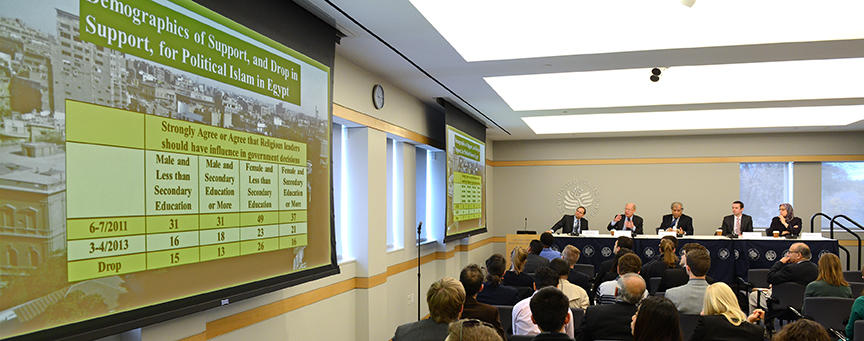Public Opinion in the Arab World: What do the latest surveys tell us?
The U.S. Institute for Peace (USIP), the Arab Barometer, the Arab Reform Initiative, the Project on Middle East Democracy and the Project on Middle East Political Science cohosted a discussion and analysis of latest polling data from across the Middle East.

The Arab uprisings were a vivid demonstration of the importance of public opinion in the Middle East. Frustrated by poor governance and the lack of economic opportunity, citizens demonstrated in mass protests on the streets, and online, throughout the region. As autocrats fell, instability and extremism rose. Although democracy appears to be succeeding in Tunisia, in most of the Arab Spring countries the future is far from secure.
To learn how citizens in these countries view government, religion and economic opportunities, the U.S. Institute for Peace (USIP), the Arab Barometer, the Arab Reform Initiative, the Project on Middle East Democracy, and the Project on Middle East Political Science cohosted a discussion on how publics view the situations in their respective countries. The event highlighted new findings from the third wave of surveys (late 2012-2014) of the Arab Barometer* across 12 Arab countries including Egypt, Tunisia, Saudi Arabia, Yemen, Iraq and more.
Featured Speakers
Amaney Jamal
Edward S. Sanford Professor of Politics
Princeton University
Non-Resident Senior Fellow, Project on Middle East Democracy
Michael Robbins
Project Director of the Arab Barometer
Princeton University and the University of Michigan
Khalil Shikaki
Director of the Palestinian Center for Policy and Survey Research
Senior Fellow at the Crown Center for Middle Eastern Studies at Brandeis University
Mark Tessler
Samuel J. Eldersveld Professor of Political Science
University of Michigan
Steven Riskin
Senior Program Officer for Grants, U.S. Institute of Peace
*The Arab Barometer was also developed in consultation with Global Barometer project, a network composed of regional barometers in Latin America, sub-Saharan, East Asia and South Asia. Like other regional Democracy Barometers, the objectives of the Arab Barometer are to produce scientifically reliable data on the politically-relevant attitudes of ordinary citizens, to disseminate and apply survey findings in order to contribute to political reform and to strengthen institutional capacity for public opinion research.



